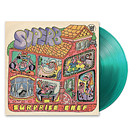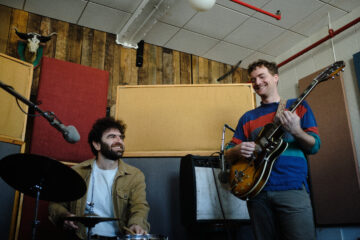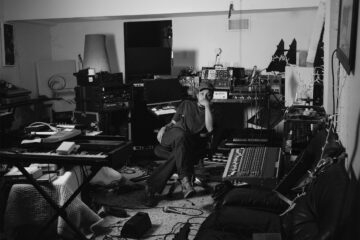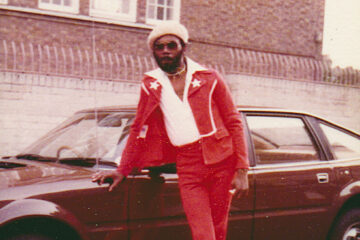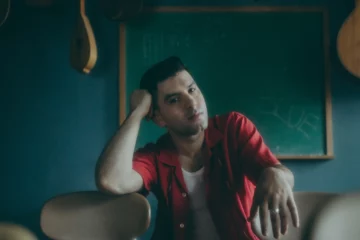For a band that makes pretty extensive music – cinematic soul as Michels put it – the eight-track tape machine offers a »healthy limitation«. There’s a silky, soft beauty to their music as heard on new tracks »Sleep Dreams« and »Dangerous«. But it’s all underpinned by their ability to groove and go hard at that when they need to. The single »Bully Ball« explores this with menacing but twinkly quality (courtesy of the vibraphone) as the piano riff chimes out with the guitar chug; the same goes for »Consulate Case« and »Tag Dag« that feature slick breakdowns too.
Since forming in 2017, the group have had years to refine this sound and had breakout releases with the albums All News Is Good News and Daylight Savings. They have reaped the benefits of finding their community in the local Melbourne scene surrounded by fellow bands and inspirations Karate Boogaloo, The Pro-Teens and The Cactus Channel.
With a few of the band living together and hosting their home studio in the Coburg suburb, it’s helped to build an innate understanding between each other. They even get their cat and »quality control officer« Baby Huey to watch over the tape counter, so they don’t record over previous takes.
»So, if we ever found ourselves debating the merits of a creative idea, we just had to hold ourselves to that mantra of ›does it feel superb‹?«
Lachlan Stuckey
Surprise Chef’s Lachlan Stuckey chats with HHV about how they changed parts of the songwriting process this time, their love for film scores, getting in the bone zone, and why they wouldn’t want Quincy Jones to produce one of their records.
The new album has been approached with more spontaneity included in the process. Why have you moved in that direction?
Stuckey: This is album number four and we’ve been gradually refining the process of how we make records. We realised the process has been steadily heading towards being more meticulous, more focused. But we realised there was a certain energy that ends up getting excluded when you start zooming in a little bit too much on the music.
We wanted to see what kind of results we’d get if we tried to be a little bit lighter in the process, not be so hard on ourselves trying to achieve a sort of specific result and just allow the music to be a little bit more fun and spontaneous. So we’d only do a few takes of each tune, rather than playing it 30 times until it feels absolutely perfect.
Why is it called Superb?
Stuckey: It’s called Superb because that was the mantra when we were making the record. We just wanted to make something that felt awesome. So, if we ever found ourselves debating the merits of a creative idea, we just had to hold ourselves to that mantra of »does it feel superb«? If yes, move on. If it’s not, we’ve got to do something to make it feel superb. The tune »Websites« personifies the superb characteristics of the record. It’s this weird drum machine-marimba jam that we recorded late at night. We’re all a little bit torched by hours in the studio, a frame of mind we like to call the bone zone. So, we’re making this goofy music that if we were a little bit more serious, we may not allow ourselves to make this track.
What pushes you into the bone zone?
Stuckey: Being in the studio and making music in the way that we do, it’s like staring into a mirror without blinking for hours. You just start to lose perspective in this microcosm where you’re harvesting all of your energy and focus and directing it into something so bizarre and obtuse, like making instrumental funk songs. Coupled with the exertion of energy that it takes because we’re recording the tape and playing tunes over and over again, we might get to 11pm and we’ve just been playing music for like 14 hours straight. You just start to get a little bit delirious. There’s a certain benefit creatively to being in that delirium, that uninhibited state, but it doesn’t always mean you make great music in that situation. But it allows you to do something you may not be able to do if you were a little bit more in control of your of your perspective.
There’s a simplicity to your music and a lot of space is afforded within it. Do you ever want to move into territory of more extravagant solos and chops from each of you?
Stuckey: No, we don’t have chops! There’s this quote I read once when Miles Davis was talking about Ahmad Jamal and his use of space. You could apply that to our music as we’re just applying space as an element. I don’t think anyone in the band is sitting there like wishing they were soloing. We all went through music school and had that institutionalised experience of jazz and improvising. In that framework, it can encourage unappealing qualities and everybody starts getting competitive and playing better than the last person. That isn’t really ever conducive to good music. None of us were really interested in trying to play really choppy jazz solos because we just gone through years of that at school and it wasn’t that hip.
What do you love about working with producer Henry Jenkins?
Stuckey: Our Lord and Saviour! He is the most crucial part of our recording process. He has an exquisite technical ability to record music, but he knows all the records that we love, and are trying to rip off. He knows how to rip them off good.
»There’s a certain benefit creatively to being in that delirium, that uninhibited state, but it doesn’t always mean you make great music in that situation.«
Lachlan Stuckey
What are those records?
Stuckey: We’ve always been ripping off David Axelrod. But lots of random bits and obscure shit. He’ll remember the weird 45 I showed him three years ago and say we should make the drum sound like that record. If Quincy Jones, may he rest in peace, kicked the door down and said »I want to produce a Surprise Chef album« we’d say »thanks buddy – we’re sorted«. One day Henry Jenkins going to have Grammy’s falling out of his coat pockets he’ll be too busy to hang out with us anymore but until that point, we’ll be making as many records with him as we possibly can.
Leon Michels named your sound as cinematic soul. Do you like having a genre pinned to you and does that reflect the music you want to write?
Stuckey: I like putting things in boxes and having a contextual understanding of something. I’m not sure whether cinematic soul is necessarily the most accurate identifier for us, but just understanding the world that something is in helps me understand it. When I think about cinematic soul, it encompasses David Axelrod, Isaac Hayes’ scores, the Giallo 60s Italian soundtracks.
But you have released tracks that don’t fit into the cinematic soul sound as much, like »Spiky Boi«. How do some of those songs get produced?
Stuckey: We recorded that for »Education & Recreation« and »Spiky Boi« was another joint where we were in the bone zone late at night. We were just going to bash out this two minute jam and we were instantly like that’s not going on the record. It’s fun but that’s not what we’re doing here. It didn’t go on the record but we put it on this EP Friendship and people dug it. That pushed us in this direction to do Superb and go in there without as much scrutiny and just deliberately being goofy.
And »Spiky Boi« was sampled by 88 Rising’s Rich Brian and Wu Tang’s legendary Ghostface Killah. Do you see your music as beats sometimes?
Stuckey: It’s cool our tune got sampled and we’d love to have that more because it’s cool having that full circle moment. Sample culture is pretty baked into our music. We all grew up listening to hip hop records but our music is equally influenced by Isaac Hayes’ records as much as it’s influenced by the records RZA made that sampled Isaac Hayes.
In 2024, Surprise Chef did a re-score of the 1970s Australian cult classic Wake in Fright. How did that experience inform your approach to Superb?
Stuckey: Without a doubt that was one of the most creatively challenging and most rewarding projects that we’ve done. We’ve never had to write music for film before. We hectically listened to Italian Giallo scores and European film music from the 60s and 70s, such as scores by Piero Umiliani and Piero Piccioni. It probably had the biggest impact on how we made Superb because we did Wake in Fright right before we started Superb. For six or seven weeks, we were intensively thinking about this film, debating how we were going to approach it. Every single second of that music was scrutinised because we all really wanted to make sure we were doing it right. We felt there was a massive responsibility in what we were contributing to the film. So, at the culmination of that, we played the whole thing live twice and we were so hyper focused that we flipped the script on Superb and did the opposite thing. It felt like a holiday after having to write a film score.


